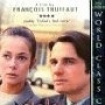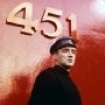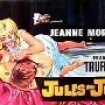Peau douce, La
| 片名: | Peau douce, La |
|---|---|
| 其它片名: | 柔肤 |
| 导演: | François Truffaut |
| 编剧: | François Truffaut, Jean-Louis Richard |
| 制片人: | François Truffaut, António da Cunha Telles |
| 摄影: | Raoul Coutard |
| 剪辑: | Claudine Bouché |
| 主演: | Jean Desailly, Françoise Dorléac, Nelly Benedetti |
| 音乐: | Georges Delerue |
| 片长: | 113分钟 |
| 年份: | 1964年 |
| 类型: | 剧情 |
| 国别: | 法国/葡萄牙 |
| 语言: | 法语/葡萄牙语/英语 |
| 格式: | |
| 制作机构: | Les Films du Carrosse |
影片概述 . . . . . .
The title of the film, LA PEAU DOUCE (THE SOFT SKIN) is notable for the multiple images and meanings it suggests. Truffaut's fourth feature film is study of the delicate balances of life and the important role that happenstance can play.
The opening sequence sets everything in motion. Pierre is rushed to the Paris airport and very nearly misses his plane for Lisbon. Had he missed that plane, we would not have the particular chain of events that follow. Chance meetings and ironic occurrences are what makes life 'happen', and they can disrupt the delicate surface (the 'soft skin') of what looks like a complacent, bourgeois existence.
Apart from having a roving eye, Pierre Lachenay is a pretty harmless figure. He has achieved a degree of success in the literary field as an editor and scholar (not a risk-taking creator, but one who safely appreciates the creativity of others such as Balzac or Gide). With everything seemingly under control in his life, he is unable to resist the compulsion to pursue the flight attendant. Apart from her physical appeal, Nicole offers Pierre a different angle on life: non-intellectual and romantic. The film does not condemn Pierre for his dalliance. By using Jean Desailly for the lead, Truffaut allows us to see him as an 'Everyman'. This could happen to anybody. Nicole, for her part, is attracted to Pierre's intellect and the way he brings out her own natural intelligence. This dynamic is central: the characters compliment each other. Casting a handsome actor like Alain Delon would have destroyed this effect.
What is interesting to watch in this film is the way Pierre's life gradually self-destructs. He is fully aware of what he is doing and Desailly is adept at conveying the protagonist's ambivalence. He does not really want to give up his home life for Nicole, yet he is drawn by her enough to continue an affair that will lead to annihilation. A finely-drawn portrait of middle-class life is given to us in this film. We are allowed to see the way someone can be busy enough (in this case with travelling) not to take the trouble to observe how complacent his life really is. And the disrupting effect of his affair on the delicate surface of his life is devastating. It is hard not to be sympathetic when Nicole leaves him--now he has no one.
The Reims sequence is particularly effective is showing how superfluous Nicole really is to Pierre. He brings her along, then ends up virtually ignoring her. Without meaning to be, she is only a disruptive element. The Reims scenes also exemplify the film's view of men and women as fundamentally different. Men, in this film, are intellectual and unable to express feeling properly, or at all. Women are all emotion, outsiders to the abstract world of men. For this reason, Franca (his wife) destroys Pierre, who has destroyed the only life she has. While seemingly reductive, this is a valid way to look at the genders in the early 60s, before women were consistently viewed as having a life outside the home.
The film's title can refer to Nicole's seductive, soft skin. It can also signify the tremulous, unstable quality of life. There is also a joke, in the Reims theater lobby: Truffaut allows us to view a poster for a film called PEAU DE BANANE (BANANA SKIN). The joke is typical of the Nouvelle Vague elements that Truffaut was gradually shedding, or incorporating into his style. Elements that remain are the jump cuts and use of real locations, particularly Paris. But the luminous black-and-white photography and Delerue's beautiful score, point toward a more a more conventional style. LA PEAU DOUCE is a calm, transitional film after Truffaut's three New Wave masterpieces
杜魯福電影總和愛情有關,這部影片是少有的真實和現化感,最後男主角被妻子槍殺,很暴烈的,雖然他是否死了,觀眾不知道,但電影似乎告誡男人,偷情沒有好下場,自己受罪。
偷情的化學因素
片中的男主角和情人邂逅於機上,重遇於電梯,纏綿於房間。他們在巴黎,想找一間酒店安頓下來,但門房叫他們等15分鐘,那一刻,兩人因偷情不見光,感覺特別無助,彷彿在冷漠的巴黎市內,找不到一個溫暖的床舖,兩顆心若有所失。
兩人後來一起,男主角作演講,情人無票可進場,她在外面呆等,後來他出來,也不敢和情人相認,兩人分開路走,她更被陌生男子調戲。他和戴眼鏡的男人同路,進入一間咖啡店,流露出焦急又苦悶心情。後來,他乘機溜回酒店,和情人相會,兩人心情壞透了,決定離開往別處。只可偷偷摸摸,表現出偷情的真實感受。
愛與恨
妻子隱約知道他偷情,決絕離婚。但情人無意和他結婚,他又想回頭,表現出三人關係。有一幕是女兒在屋內玩耍,兩夫婦吵起來,同時又親密同床,預告了兩人最後一次同床,氣氛令人不安。片中觸發點是照片,他為情人拍了一些照片,成為偷情證據,妻子嫉妒、憤怒,決定殺死他。
The opening sequence sets everything in motion. Pierre is rushed to the Paris airport and very nearly misses his plane for Lisbon. Had he missed that plane, we would not have the particular chain of events that follow. Chance meetings and ironic occurrences are what makes life 'happen', and they can disrupt the delicate surface (the 'soft skin') of what looks like a complacent, bourgeois existence.
Apart from having a roving eye, Pierre Lachenay is a pretty harmless figure. He has achieved a degree of success in the literary field as an editor and scholar (not a risk-taking creator, but one who safely appreciates the creativity of others such as Balzac or Gide). With everything seemingly under control in his life, he is unable to resist the compulsion to pursue the flight attendant. Apart from her physical appeal, Nicole offers Pierre a different angle on life: non-intellectual and romantic. The film does not condemn Pierre for his dalliance. By using Jean Desailly for the lead, Truffaut allows us to see him as an 'Everyman'. This could happen to anybody. Nicole, for her part, is attracted to Pierre's intellect and the way he brings out her own natural intelligence. This dynamic is central: the characters compliment each other. Casting a handsome actor like Alain Delon would have destroyed this effect.
What is interesting to watch in this film is the way Pierre's life gradually self-destructs. He is fully aware of what he is doing and Desailly is adept at conveying the protagonist's ambivalence. He does not really want to give up his home life for Nicole, yet he is drawn by her enough to continue an affair that will lead to annihilation. A finely-drawn portrait of middle-class life is given to us in this film. We are allowed to see the way someone can be busy enough (in this case with travelling) not to take the trouble to observe how complacent his life really is. And the disrupting effect of his affair on the delicate surface of his life is devastating. It is hard not to be sympathetic when Nicole leaves him--now he has no one.
The Reims sequence is particularly effective is showing how superfluous Nicole really is to Pierre. He brings her along, then ends up virtually ignoring her. Without meaning to be, she is only a disruptive element. The Reims scenes also exemplify the film's view of men and women as fundamentally different. Men, in this film, are intellectual and unable to express feeling properly, or at all. Women are all emotion, outsiders to the abstract world of men. For this reason, Franca (his wife) destroys Pierre, who has destroyed the only life she has. While seemingly reductive, this is a valid way to look at the genders in the early 60s, before women were consistently viewed as having a life outside the home.
The film's title can refer to Nicole's seductive, soft skin. It can also signify the tremulous, unstable quality of life. There is also a joke, in the Reims theater lobby: Truffaut allows us to view a poster for a film called PEAU DE BANANE (BANANA SKIN). The joke is typical of the Nouvelle Vague elements that Truffaut was gradually shedding, or incorporating into his style. Elements that remain are the jump cuts and use of real locations, particularly Paris. But the luminous black-and-white photography and Delerue's beautiful score, point toward a more a more conventional style. LA PEAU DOUCE is a calm, transitional film after Truffaut's three New Wave masterpieces
杜魯福電影總和愛情有關,這部影片是少有的真實和現化感,最後男主角被妻子槍殺,很暴烈的,雖然他是否死了,觀眾不知道,但電影似乎告誡男人,偷情沒有好下場,自己受罪。
偷情的化學因素
片中的男主角和情人邂逅於機上,重遇於電梯,纏綿於房間。他們在巴黎,想找一間酒店安頓下來,但門房叫他們等15分鐘,那一刻,兩人因偷情不見光,感覺特別無助,彷彿在冷漠的巴黎市內,找不到一個溫暖的床舖,兩顆心若有所失。
兩人後來一起,男主角作演講,情人無票可進場,她在外面呆等,後來他出來,也不敢和情人相認,兩人分開路走,她更被陌生男子調戲。他和戴眼鏡的男人同路,進入一間咖啡店,流露出焦急又苦悶心情。後來,他乘機溜回酒店,和情人相會,兩人心情壞透了,決定離開往別處。只可偷偷摸摸,表現出偷情的真實感受。
愛與恨
妻子隱約知道他偷情,決絕離婚。但情人無意和他結婚,他又想回頭,表現出三人關係。有一幕是女兒在屋內玩耍,兩夫婦吵起來,同時又親密同床,預告了兩人最後一次同床,氣氛令人不安。片中觸發點是照片,他為情人拍了一些照片,成為偷情證據,妻子嫉妒、憤怒,決定殺死他。
导演阐述 . . . . . .
获得奖项 . . . . . .
评论列表(0) . . . . . . ( 发表新评论 ) ( 更多评论 )
幕后花絮 . . . . . . (上传花絮) (展开所有)
影片图集 . . . . . . (更多/我要上传)
相关视频 . . . . . . (更多/我要分享)
- Peau douce, La 2009-3-23 17:43,4444分享
对本影片资料作出贡献的会员 . . . . . .
4444(创建者)






































